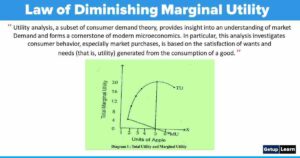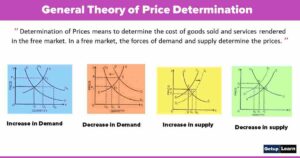Table of Contents
- 1 What is Business Economics?
- 2 Definition of Business Economics
-
3 Characteristics of Business Economics
- 3.1 Microeconomic in Nature
- 3.2 Applied Concept
- 3.3 Theory of the Firm
- 3.4 Normative Science
- 3.5 Helpful in Future Planning
- 3.6 Coordinating in Nature
- 3.7 Science as well Art
- 3.8 Multidisciplinary
- 3.9 Macroeconomics is also useful to Business Economics
- 3.10 Helpful in Managerial Decisions
- 3.11 More Amended and Refined Subject
- 4 Scope of Business Economics
- 5 Nature of Business Economics
- 6 Importance of Business Economics
- 7 Difference Between Business Economics and Economics
- 8 FAQ Related to Business Economics
What is Business Economics?
Business Economics, also called Managerial Economics, is the application of economic theory and methodology to business. Business involves decision-making. Decision-making means the process of selecting one out of two or more alternative courses of action.

Table of Contents
The question of choice arises because the basic resources such as capital, land, labour, and management are limited and can be employed in alternative uses.
Organisations face many problems on a day to day basis. These problems require careful analysis and thoughtful consideration. For example, organisations are always concerned with producing maximum output in the most economical way.
To solve problems of such nature, managers are required to apply various economic concepts and theories. The application of economic concepts, theories, and tools in business decision making is called business economics or managerial economics.
Definition of Business Economics
[su_quote cite=”Mansfield”]Business economics is concerned with the application of economic concepts and economics to the problems of formulating rational decision making.[/su_quote]
[su_quote cite=”Spencer and Siegelman”]Business economics is the integration of economic theory with business practice for the purpose of facilitating decision making and forward planning by management[/su_quote]
[su_quote cite=”Douglas”]Business economics is concerned with the application of economic principles and methodologies to the decision making process within the firm or organization. It seeks to establish rules and principles to facilitate the attainment of the desired economic goals of management[/su_quote]
[su_quote cite=”Davis and Chang”]Business economics applies the principles and methods of economics to analyze problems faced by the management of a business, or other types of organizations and to help find solutions that advance the best interests of such organization.[/su_quote]
Characteristics of Business Economics
On the basis of the above definitions following nature or characteristics of business economics may be observed:
- Microeconomic in Nature
- Applied Concept
- Theory of the Firm
- Normative Science
- Helpful in Future Planning
- Coordinating in Nature
- Science as well Art
- Multidisciplinary
- Macroeconomics is also useful to Business Economics
- Helpful in Managerial Decisions
- More Amended and Refined Subject
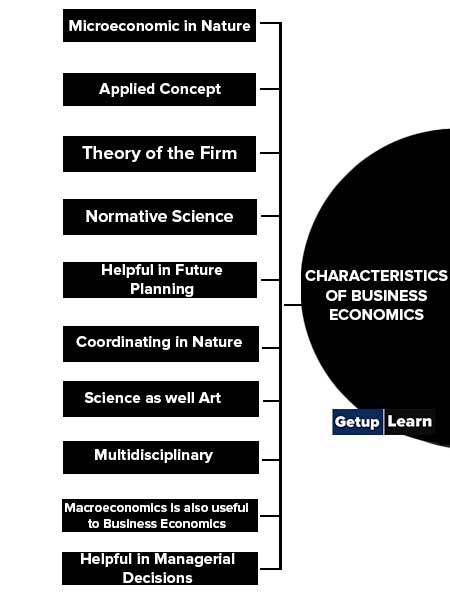
Microeconomic in Nature
Business economics is microeconomic in nature: As the unit of study in business economics is a business firm so the various problems of a business firm, are studied in it, so we can say that business economics is microeconomic in nature.
Applied Concept
Business economics is not descriptive economics, this is an applied concept. It bridges the gap between economic principles and practical aspects, various types of rules are propounded in it and various variables are determined, and the decision is taken regarding the relationship observed between various variables.
Theory of the Firm
Business economics largely used that body of economic concepts and principles which is known as the theory of the firm. In addition, it also seeks to apply profit theory, which forms part of distribution theory in economics.
Normative Science
As discussed in 1.3, economics is a positive as well as a normative science. In business economics, majorly normative aspects of theories are studied. What ought to be is the basis of various business decisions. The law of demand studies the inverse relationship between the price of a commodity and its quantity demanded.
Business economics studies the good or bad effects of the operation of the law of demand for a business firm.
Helpful in Future Planning
Business economics help business managers in decision-making & future planning with regard to demand, sales, cost and profit. Like various techniques of demand forecasting and scale of operations and resources to be employed are used for future perspective demand.
It represents the quantitative picture before a business manager so that he can select the best alternative among the various alternatives available.
Coordinating in Nature
Business economics establishes coordination between economic principles and their practical aspects and it also widens the way of the success of the business, as it is dependent on theoretical as well as practical aspects. Hence, business economics is of coordinating in nature.
Science as well Art
Business economics is a science as well as an art. Cause effect relation and systematic knowledge of the subject make it a science while the practical use of various theories; principles and laws make it an art.
Multidisciplinary
Business economics is multidisciplinary. Business economics is related to various subjects like statistics, psychology, sociology, mathematics, functional research, management, accounting and advance planning etc. In this regard, Prof. D.C. Hague has said that business economics is related to the application of the logic of mathematics and statistics.
So that it may provide an effective way for thoughts relating to problems of business decisions.
Macroeconomics is also useful to Business Economics
As business economics provides an understanding of the environment of the economy. Business economist has to scientifically analyze various macroelements (like trade cycles, national income, accounting, foreign trade policy, price policy, labour policy, monetary policy, fiscal policy, etc.) and adjust the decisions of the firm with this element.
Helpful in Managerial Decisions
Business economics helps corporate managers in various types of decision-making. Managers have to make decisions regarding the combination and employment of various factors of production and the scale of production in order to maximize the output at the minimum cost.
Thus, business economics helps corporate managers in making correct and suitable decisions in order to attain the basic objectives of such corporate bodies.
More Amended and Refined Subject
It is more amended and refined in comparison to general economics, because:
- It is based on more scientific and practical assumptions.
- Its principles help the managers in taking appropriate decisions during business uncertainties.
- Modern mathematical and scientific tools are used in it for purpose of analysis.
- Business economics is concerned with what decisions ought to be made and hence involves a value judgment.
Scope of Business Economics
Let us discuss the scope of business economics in detail:
- Demand Analysis and Forecasting
- Cost and Production Analysis
- Pricing Decisions, Policies, and Practices
- Profit Maximisation
- Capital Management
- Effective Utilization of Business Resources
- Effective Use of Economic Policies for Business Development
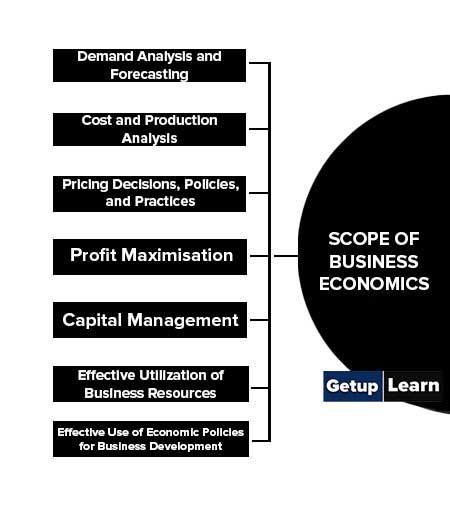
Demand Analysis and Forecasting
The foremost aspect regarding scope is demand analysis and forecasting. A business firm is an economic unit that transforms productive resources into saleable goods. Since all output is meant to be sold, accurate estimates of demand help a firm in minimizing its costs of production and storage.
A firm must decide its total output before preparing its production schedule and deciding on the resources (land, labour, capital and technology) to be employed. Demand forecasts serve as a guide to the management for maintaining its market share in competition with its rivals, thereby securing its profit.
This process is important for an organisation to analyse the demand for its products and produce accordingly. In business economics, demand forecasting occupies an important place by helping organisations in business planning and deciding on strategic issues.
Cost and Production Analysis
A firm’s profitability depends much on its costs of production. A wise manager would prepare cost estimates for a range of output and identify the factors that cause deviations in cost (increase or decrease). Once the factors are known, it can be possible to determine the optimum level of output where the cost of production would be minimum.
Production processes are under the charge of engineers but the business manager works to carry out the production function analysis in order to avoid wastage of materials and time. Sound pricing policies(determining selling price) depend much on cost control.
The main topics discussed under cost and production analysis are Cost concepts, cost-output relationships, Economies and Diseconomies of scale and cost control.
Pricing Decisions, Policies, and Practices
Pricing is one of the key areas of business economics. It is a process of finding the value of a product or service that an organisation receives in exchange for its product/service. The profit of an organisation depends a great deal on its pricing strategies and policies.
Business economics includes various pricing-related concepts, such as pricing methods, product-line pricing, and price forecasting. Another task before a business economist is the pricing of a product.
Since a firm’s income and profit depend mainly on the price of the product, the pricing policies and all such decisions are to be taken after careful analysis of the nature of the market in which the firm operates. The important topics covered in this field of study are Market Structure Analysis, Pricing Practices and Price Forecasting.
Profit Maximisation
Profit generation and maximisation is the main aim of every organisation (except for non-profit organisations). In order to maximise profit, organisations need to have complete knowledge about various economic concepts, such as profit policies and techniques, and break-even analysis.
Capital Management
Organisations often find it difficult to make decisions related to capital investment. These decisions require sound knowledge and expertise in various economic aspects. To make sound capital investment decisions, an organisation needs to determine various aspects, such as cost of capital and rate of return.
Effective Utilization of Business Resources
It also studies how well resources can be put to the best possible use. Various tools and techniques are used to determine least-cost- maximum profit combinations. Methods such as linear programming, and networking analysis are used in determining the optimal levels of performance.
Effective Use of Economic Policies for Business Development
Business economics is micro in character but it is always influenced by macro factors. For example, an individual firm’s idea (microeconomic) of manufacturing plastic bags may be affected by the ban on plastic by the government (macroeconomic). Thus economic policies (macro) have to be carefully studied in order to make proper business decisions.
Sometimes economic policies of government also create a favourable environment for business units. For instance, the Make In India initiative has motivated banks to give more loans to fund seeking companies
Nature of Business Economics
These are the nature of business economics look at them in detail:
- Business Economics is a Science
- Business Economic is an Art
- Administrations of Organization
- Helpful in Optimum Resources Allocation
- Component of Micro Economic
- Components of Macroeconomic
- Dynamic in Nature
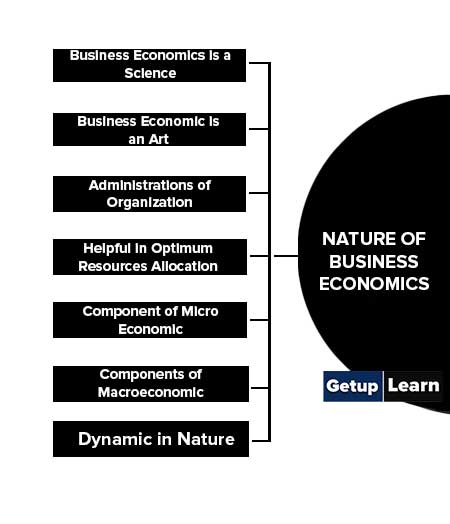
Business Economics is a Science
We know that science is a systematic body of knowledge and proof. On the other hand, business economics is also a science because the Principles and theory of business economics are proven. This is applicable to all levels of Organization and the theory of demand, theory of price, theory of profit, and theory of capital is also proved, So we can say that business economics is science.
Business Economic is an Art
Business Economics is an art because art is the application of skills that can use for the purpose of getting some relevant information and the other, In business economics theory is implemented in Practice way in business economics managerial skills is implemented. So Business Economics is an art.
Administrations of Organization
Business Economics for the administration of organization because administration gives the relevant data. They find out the problem and solve the problem immediately in an organisation and the admin decides the target on the basis of price, quality of the products, and Demand for the product.
Administration forecast the demand according to the situation of present demand of the market.
Helpful in Optimum Resources Allocation
In the organization are limited resources and these resources can be used in several places at a time with the tools and techniques of business economics. The resources will be used to get optimum output. In organisations, our ultimate objective is to earn profit so the limited resources are used in such a way to get maximum profit resources are limited.
Our resources in human and non-human resources. Human resources mean labour, employees, and Non-human resources which means land, building, machine, raw materials Etc.
Component of Micro Economic
Business economics has a component of Microeconomics. a. It is related to the internal factors of the organization. The internal factor of the organisations is the demand for the products, purchasing the raw materials, and How to use the resource to get maximum profits. These are related to the micro-component of business economics.
Components of Macroeconomic
Managerial economics has a component of macroeconomics which is related to the outside of the organisation or an external factor of the organisation.
External factors of the organisation are competition market, nature of business, Government rules and regulations, industrial law, Industrial Policies, and Taxes these are the External factor of the organisation and these types of problems are solved by business economics.
Dynamic in Nature
Business economics is dynamic in nature which means business economics has used all spaces of the organisation and all except the organisation. By the tools and techniques of managerial economics to give the relevant information and solve the problem of the organisations So, Managerial economics is dynamic in nature.
Importance of Business Economics
The significance or importance of business economics can be studied under the following heads:
- Reducing Uncertainties and Risks
- Planning and Decision Making
- Organization
- Formulating Business Policies
- Cost Control
- Establishing Proper Coordination
- Understanding External Forces
- Communication
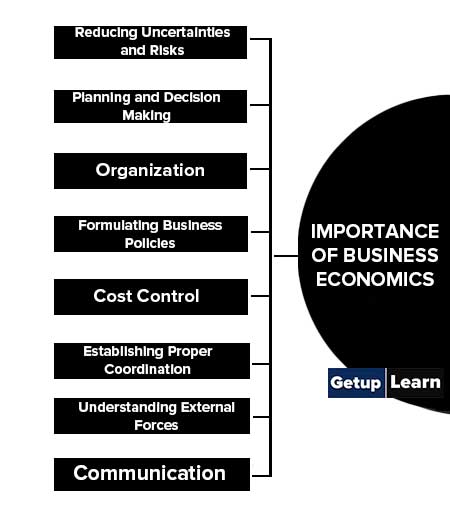
Reducing Uncertainties and Risks
Generally, business managers work in an environment of uncertainties and risks. Future demand, price, cost, capital and profit are the variables about which future forecasting are made through business economics and on the basis of such conclusions business managers minimize their risk and uncertainties.
Planning and Decision Making
Business economics helps the business managers in making future plans and decisions making in respect of increasing the production, reducing the cost, reducing or increasing the price of the commodities, raising funds from internal and external sources, etc.
Organization
A business manager knows on the basis of the study of business economics what, how, how much, for whom, when and which type of objective is to be achieved. On the basis of such knowledge, he prepares and frames an efficient business organization structure to attain the various objectives.
Formulating Business Policies
The foremost objective of every business firm is to maximize value. For doing that, various alternative policies are formulated in respect of planning and controlling, communication, wage determination and suitable returns to the investors, for the purpose of business management. For all these, business economics is of specific importance.
Cost Control
Business economics helps business managers to control organizational processes like cost control, price control, quality control and inventory control etc. As we know there is a difference between various concepts of cost in accountancy and economics.
Business economics uses all these concepts for managerial decisions and future planning by reducing the difference in accountancy and economics.
Establishing Proper Coordination
Business economics provides proper coordination for planning forecasting, decision-making, organizing, communication, control, and formulation of business policies and their execution. As a result, the organization goes on functioning smoothly, with minimum costs.
Understanding External Forces
Business economist makes several important decisions regarding coordination between various situations of the firm and external conditions, which helps in the smooth and systematic operation of the activities of the firm.
External conditions mainly include national income, trade cycles, foreign trade, taxation, labour laws, insurance, banking, transportation and communication and those national and international policies, which affect the business in any way.
Communication
Communication includes observing and sending information and messages and taking etc. Proper communication is essential for the success of a business organization. Business economics helps in establishing and executing an efficient communication system.
Difference Between Business Economics and Economics
Business economics is a branch of economics. Still, on the theoretical & practical basis, here is the difference between business economics and economics let’s see in detail:
Difference Between Business Economics and Economics
| Basis of Difference | Economics | Business Economics |
| Nature of the Subject | Economics is both of micro and macro nature. Hence, it broadly studies the economic activities of the firm, industry and the whole economy. | Whereas, business economics is of micro nature. Hence, it studies the economic activities of the particular firm. |
| Meaning | Economics means such a subject in which decision is taken regarding the utilization of time, power and wealth and how wealth is to be spent. | In business economics that part of economics is incorporated, which is known as the principal of the firm and which may be helpful in making business decisions. |
| Base of Analysis | In economics, economic principles have been normally propounded on the basis of several assumptions and exceptions. | Whereas in business economics assumptions are analyzed after testing, these assumptions by giving practical shape to them. |
| Area of Scope | The scope of economics is wider and more comprehensive, because it studies, not only the particular firm but the consumption, production, exchange and distribution of all economic problems. | Whereas business economics has a relatively limited scope because it studies the problems related to the production and exchange of particular firms. |
| Approach | The approach of economics is descriptive. | Whereas its approach is perspective. |
| Use of Principles | In it, abstract economic principles are used to solve the problem of the firm. | Whereas in business economics traditional economic principles are used. |
| Analysis System | It analyses certain economic events and then propounds general policies. | Whereas business economics studies the practical aspects of economic events. |
| Theoretical and Practical Aspects | Economics studies the Theoretical aspects of economic events. | Whereas business economics studies the practical aspects of economic events. |
| Normative and Positive | The form of economics is normative as well as a positive science. | Whereas the form of business economics is only normative science. |
| Phase of Development | Since it is from the beginning so the duration of its development is long. | Whereas the development of business economics has taken place after the second world war. Hence, the duration of its development is relatively short. |
| Type of Problem Analyzed | Economics analysis the economic problems of the firm and the human beings both. | Whereas, In it, only the problems of the particular firm are analyzed and not of human beings |
What is meant by business economic?
Business economics helps in analyzing alternatives and selecting the best one, which would achieve the optimal result. It assimilates concepts and methods from all disciplines viz., microeconomic theory, macro-economic theory, the theory of decision-making, operations research and statistics, and thus trains a businessman to integrate all these concepts and methods to enable him to solve business problems.
Which is the best definition of Business Economics?
Business economics is concerned with the application of economic concepts and economics to the problems of formulating rational decision making. By Mansfield
What are the characteristics of Business economics?
Characteristics of Business Economic
1. Microeconomic in Nature
2. Applied Concept
3. Theory of the Firm
4. Normative Science
5. Helpful in Future Planning
6. Coordinating in Nature etc.
What are the three scope of economics?
Let us discuss the scope of business economics in detail: 1. Demand Analysis and Forecasting, 2. Cost and Production Analysis, 3. Pricing Decisions, Policies, Practices etc.


